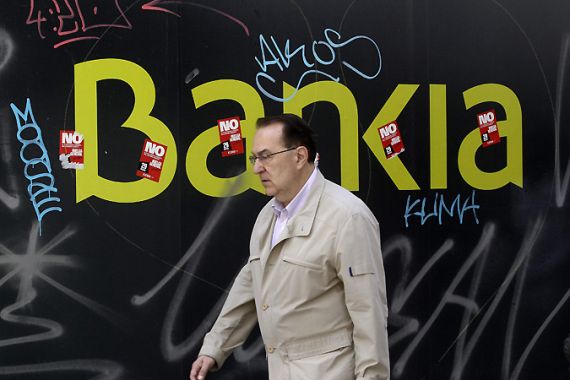Spanish bank stocks slide on debt fears
Bankia shares fall more than 13 per cent as Spain’s borrowing risk premium reaches euro-era high.

Shares in Spanish banks have tumbled as the country’s prime minister expressed concern over rising borrowing costs amid fears that it could be the next country sucked into the eurozone debt crisis.
Bankia, which said over the weekend that it was seeking further state funds to stay afloat, slumped by more than 13 per cent on the Madrid stock exchange while Banco Popular fell 7.50 per cent and CaixaBank dropped 5.09 per cent.
Keep reading
list of 4 itemsIndia’s income inequality widens, should wealth be redistributed?
Biden slaps new tariffs on Chinese imports, ratcheting trade war
One of the biggest hurdles for athletes on the Olympic path: Money
Santander, the biggest bank in the eurozone by market value, tumbled 3.23 per cent and BBVA declined 3.39 per cent.
Mariano Rajoy, the Spanish prime minister, said Madrid was struggling to borrow as its risk premium hit a euro-era record.
Spain’s sovereign debt risk premium – the extra return investors demand to hold Spanish bonds over their safer German counterparts – leapt to 514 basis points.
“With a risk premium at 500 points, it is very difficult to raise finances,” Rajoy told a news conference on Monday.
He played down the repercussions of Bankia’s troubles, saying it would have no impact on efforts to trim the public deficit and denied yit had undermined confidence in Spanish sovereign debt.
Rajoy had sought to calm investors after the distressed lender Bankia pleaded for the biggest state rescue in Spanish history, reiterating his government’s line that it would not seek a foreign bailout.
But Bankia’s request on Friday for 19bn euros ($24 bn) in state funds nevertheless raised concerns over the entire sector as reports circulated that other banks could need another 30 billion euros ($37.6 bn)
“Far from calming the debt markets and share prices, Rajoy’s words accelerated the drop in bank prices and failed to dispel doubts about where the money is coming from to be injected into Bankia,” said Daniel Pingarron, analyst at brokerage IG Markets.
Rising national debt
If the state finds itself unable to raise the cash on the financial markets, investors fear that, despite the denials, the eurozone’s fourth largest economy could be forced to go cap in hand to Brussels.
Bankia’s board met on Friday and requested the bailout. When taken together with a 4.5bn-euro ($5.6bn) capital injection made earlier this month, the total bill would be an unprecedented 23.5bn euros ($29.46bn).
Until now, the state-backed Fund for Orderly Bank Restructuring (FROB) has raised finances in the debt markets and then transferred the money into troubled banks.
But the FROB only has 5.4 billion euros, of which one billion has already been committed to the Banco de Valencia, which was recently taken over by the state, Bankinter analysts said in a report.
“We are studying two options,” an economy ministry spokeswoman told the AFP news agency.
“The first is our preferred option, which is to go to the market,” raising funds for Bankia with a bond issue, she said.
The second option would be to inject government bonds directly into the bank, the spokeswoman said.
The bank could use the bonds as collateral to raise liquidity with the European Central Bank or sell them, she explained. This, however, would not prevent Spain’s debt from rising above Madrid’s end-2012 target of 79.8 per cent of gross domestic product.
“The idea of such a debt/equity swap for Bankia looks clever, or is it too clever,” said Berenberg Bank chief economist Holger Schmieding.
“The key issue is whether such a debt-equity swap would do enough to bolster public trust in Spanish banks and thus safeguard their deposit base,” he added.
According to centre-right daily El Mundo, the state might have to inject another 30bn euros in public funds into three other banks it has taken over: CatalunyaCaixa, NovacaixaGalicia and Banco de Valencia.
That would bring the total bill to more than 50bn euros ($62.7bn), enough to sow doubts about Spain’s capacity to pay up at a time when it is struggling to trim its budget deficit.
Concerns about spending by Spain’s powerful regions are also weighing on sentiment.
Catalonia president Artur Mas called Friday for the central government to approve the use of “hispanobonos” jointly issued by the regions and guaranteed by the state. His region alone faces debt payments, including refinancing costs, of 13.48 bn euros ($16.9 bn) in 2012.